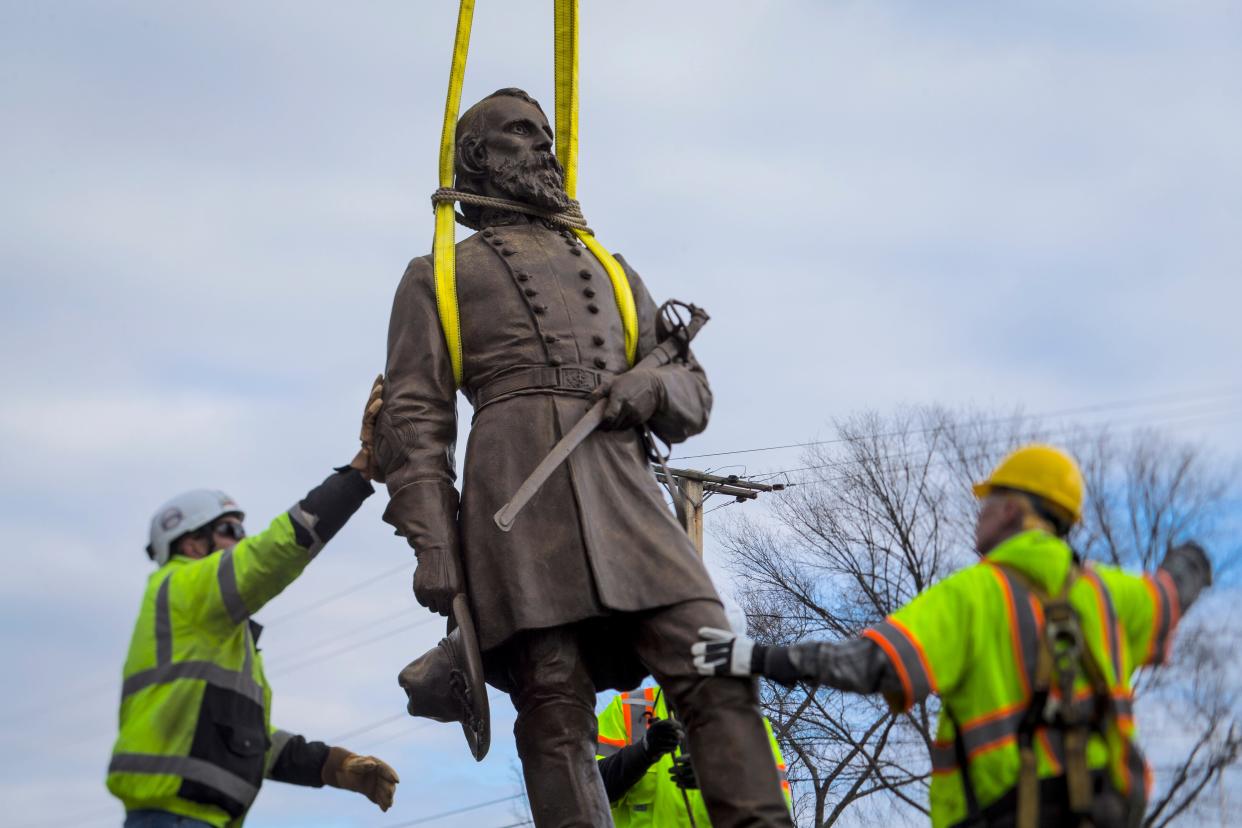Mark Woods: The contrast between the Confederate capital and Jacksonville

In the waning days of 2022, the juxtaposition of images from Jacksonville and Richmond was striking.
In Richmond — in the Virginia capital of the Confederacy for most of the Civil War — a crew of workers wearing yellow vests gathered around a statue in the middle of an intersection.
Not long after 9 a.m. on a Monday morning, they cut a bolt holding in place the bronze likeness of Confederate Gen. Ambrose P. Hill. Then, using a crane and yellow straps looped under the statue’s arms, they carefully lifted it off its base and laid it down on a flatbed truck.
One tire was placed around the statue’s head, cushioning it as the truck drove away.
For Richmond, it was a monumental moment. It once had more Confederate monuments than any other city in America. This was the last city-owned one still standing. Like the others, it’s now in a storage facility, destined for a museum.
"I'm proud of my city," Richmond Mayor Levar Stoney said. "We've done something that a lot of communities have struggled with ..."
Jacksonville, of course, is one of those communities that continues to struggle with what to do with Confederate monuments. At the very heart of our downtown, the park in front of City Hall, we have quite the symbol of this — a granite column that no longer has the statue atop it but still has “Confederate Memorial” inscribed on its base.
And while the images from Richmond were of city workers lifting a statue off its base and laying it in a flatbed truck headed for a storage facility, the most dramatic images from Jacksonville were of police pulling a 72-year-old local activist away from the City Council lectern and his nearby scooter. After Ben Frazier spent more than his allotted 65 seconds calling for the monuments to come down, he was removed from council chambers and placed in a cruiser headed to jail.
From Charlottesville to Jacksonville?
This came on the heels of a Tampa-based group, with a North Carolina lawyer as its spokesman, hiring planes to fly banners over downtown Jacksonville, including the football stadium during a Jaguars game, with a Confederate flag and messages supporting Confederate monuments.
The past week also included news from New York City that subway passengers were greeted with antisemitic fliers from a white supremacist group. An organization fighting antisemitism said the group is led by someone who recently moved from his California hometown to … Jacksonville.
With its removal of Confederate monuments, Richmond didn’t erase its history. It still will remember the Civil War and its place in it. But the city made a decision that none other than Robert E. Lee advocated for immediately after the war. While Lee supported remembering Confederate casualties with gravestones, he opposed having grand public monuments to the Confederacy, saying that would only “keep open the sores of war” and prevent the United States of America from moving forward.
Decades later, particularly during Jim Crow era segregation and the rise of the Ku Klux Klan, many cities put up monuments to the Confederacy.
When Richmond decided to move those monuments from its public squares — with an approach that has been described as offering “a model for other jurisdictions struggling to balance racial injustice with historical preservation” — it didn’t magically remove a host of 21st-century issues.
But it did instantly make the city less of a magnet for some of what had been happening there and in nearby Charlottesville — and what could happen in another ‘ville.
More than 150 years after the Civil War ended, with more and more Southern cities taking down monuments that went up after the war — often long after — Jacksonville is on a path to becoming a modern-day battleground.
Council ignores key part of recommendations
In recent years, even as Jacksonville Mayor Lenny Curry budgeted money for removals, the City Council’s response to everything related to monuments has been pretty much the same: nothing.
Faced with how to approach this issue, the majority of council has punted more often than the Jaguars. At times, some council members have pointed to a report that a Mayor’s Working Group, convened in the summer of 2020, released last year. They’ve noted that a respected group of local historians and museum directors said the future of Jacksonville’s monuments to the Confederacy “should be determined as part of a comprehensive plan.”
While noting this, they have conveniently ignored a key piece of the report — the one sentence in it that was italicized for emphasis.
“To be clear, these monuments must no longer stand as they have, in celebration of the Confederacy.”
More than a year later, we have some council members who clearly don’t want to touch this issue, who hope it will go away (particularly as they run for mayor), who respond to any questions about it by saying we have more important things to worry about.
We do have many other issues to worry about. But that doesn’t mean we shouldn’t tackle this one. It isn’t going away. And we should realize by now that doing nothing doesn’t mean nothing happens.
Jacksonville never was the capital of the Confederacy. It never was one of the cities that was synonymous with the Civil War. While it certainly had a place in history, including perhaps most notably the sinking of the Maple Leaf in the St. Johns River, it wasn’t a place that routinely made headlines across 19th century America for its battles.
But, somehow, it feels like that’s where we’re headed now.
mwoods@jacksonville.com
(904) 359-4212
This article originally appeared on Florida Times-Union: Jacksonville's Confederate monument debate isn't going away soon

